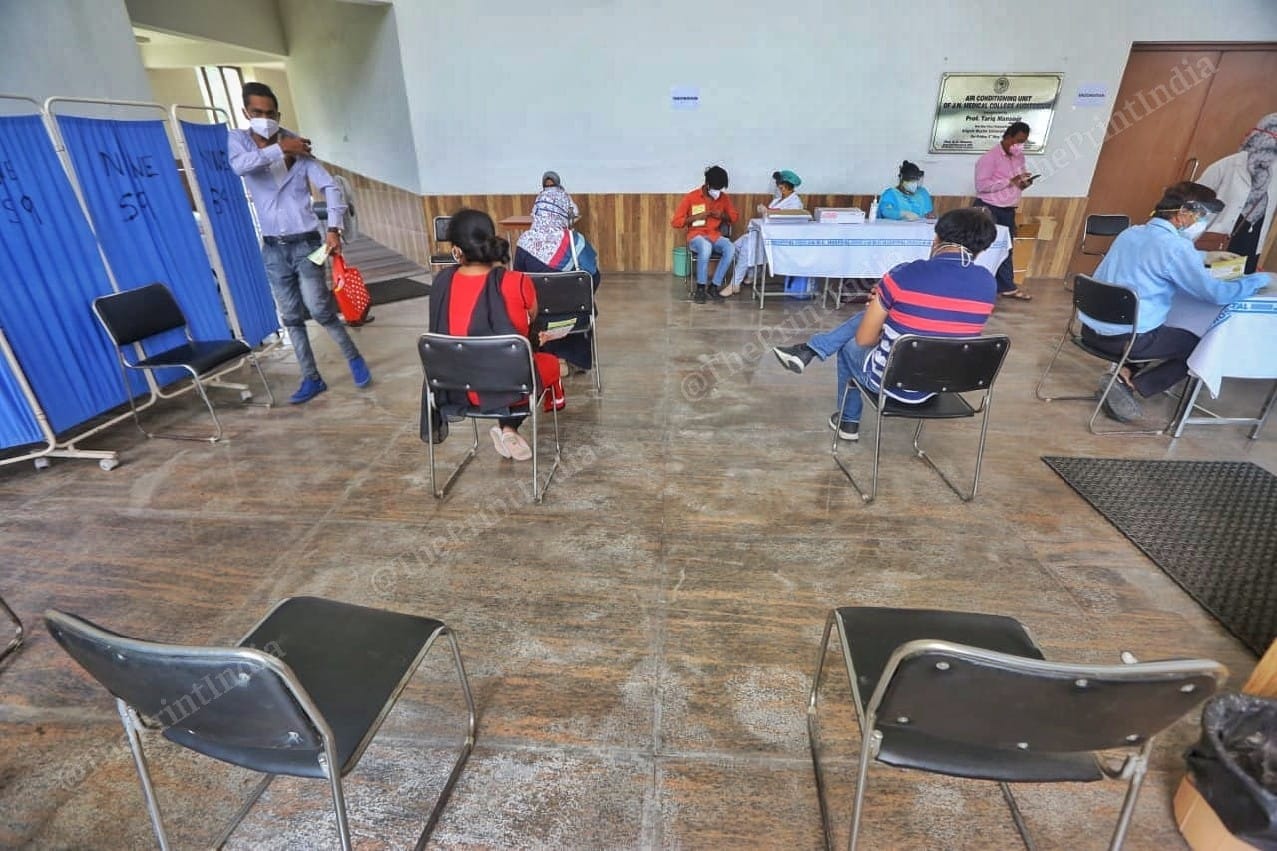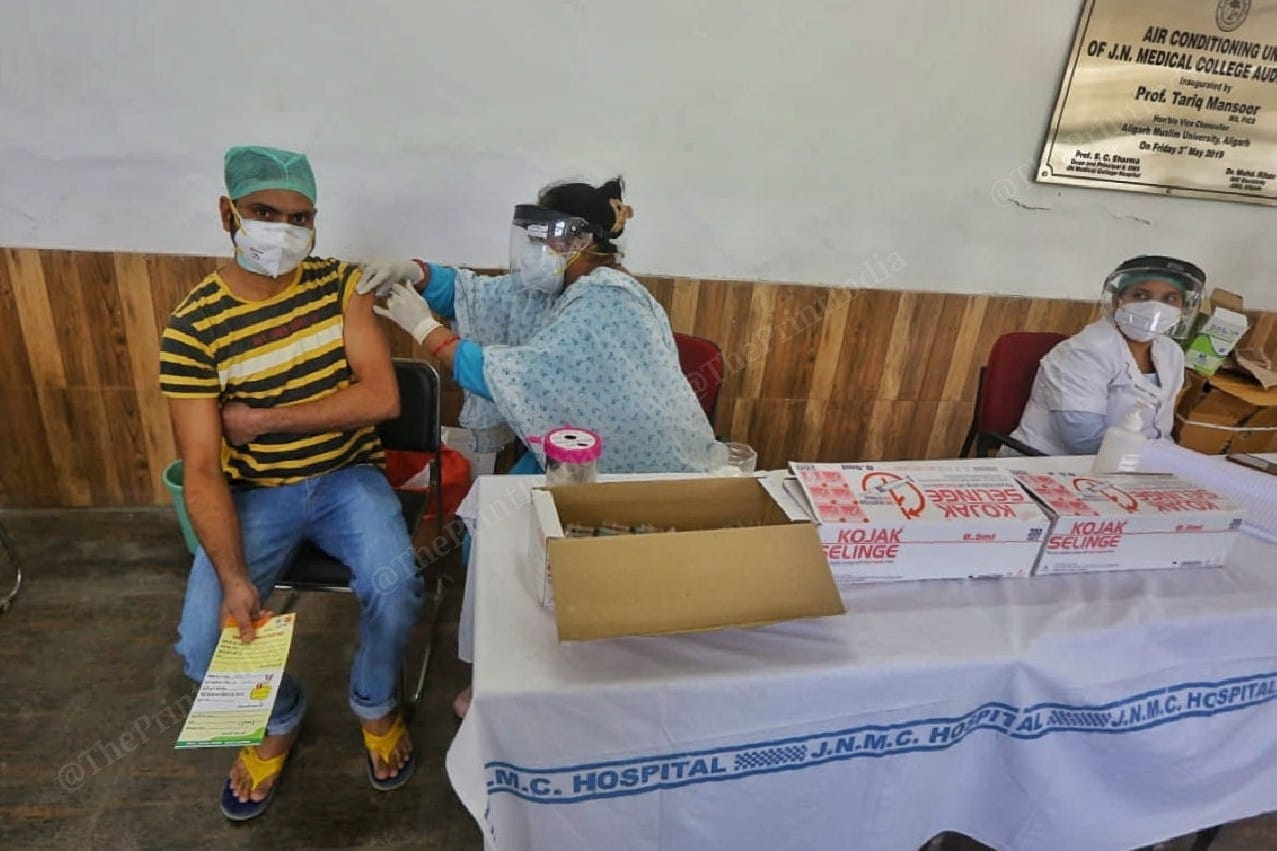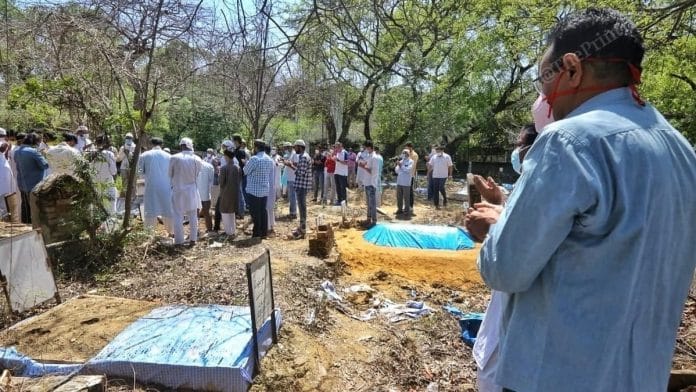Aligarh: At least 18 professors working at Aligarh Muslim University (AMU) died due to Covid-19 and post-Covid complications in the last month. None of them were fully vaccinated, with only two taking the first dose, ThePrint has learnt.
According to official data accessed by ThePrint, the latest teaching faculty member to succumb to the virus is 55-year-old Mohammad Nasiruddin, from the Department of Pharmacology. The list includes one suspected Covid case too — the cause of death in the records is pneumonia.
According to sources in the university, only two of the 18 professors had taken the first shot of the Covid vaccine.
“From the official list of 18 professors who died, suffering from Covid and post-Covid complications, only two of them had taken the first shot. Both of them had taken the shot only one week and three days before they got infected with the virus,” said a senior doctor at the Jawaharlal Nehru Medical College (JNMC), who didn’t wish to be named.
The JNMC is part of AMU and its campus, where the safety trials of Bharat Biotech’s Covaxin started in November and is still ongoing.
“All these professors contracted Covid and died due to it during the month of Ramzan, between 19 April and 16 May,” said AMU Proctor Waseem Ali.
While almost all of the affected families refused to speak on the matter, professors, administrative officials, doctors and students on the campus cited careless attitude, mistrust in vaccines and Ramzan fasting as reasons for poor vaccination.
Of those who dead, three were below the age of 50.
JNMC doctors also cited comorbidities as a reason for the deaths. “Most of these professors suffered from comorbidities such as hypertension and diabetes. Their condition worsened with time,” said Dr Mohammed Shamin, who is in the department of tuberculosis and chest.
Senior administration officials also cited self-medication as one of the reasons behind the high toll.
“Many of those whose health deteriorated and eventually died indulged in self-medication. They took paracetamol at home without proper consultation and only got admitted much later. Some of them didn’t even want to get tested,” said a second senior doctor, who didn’t wish to be identified.
While the university is yet to officially state the number of deaths among the non-teaching faculty, sources in the administration said over 25 non-teaching officials have died of Covid since mid-April. Many retired professors have died too.
Masroor Ahmed, the in-charge of AMU graveyard for faculty and their families since 2003, said he had never seen so many bodies before.
Also read: Two vaccine doses needed for ‘strong protection’ against Covid variant from India: FT report
Vaccine hesitancy
ThePrint spoke to students, professors, administrative officials and doctors on the campus to understand why the professors didn’t get vaccinated even though safety trials of Bharat Biotech’s Covaxin started at AMU in November, with over 1,000 volunteers. The trial is still ongoing.
Dr Mohammed Shamim, the principal investigator of the Covaxin trial at the university, said, “AMU staff, including the professors, were apprehensive to get the vaccine because trials of Covaxin aren’t over. Most of the stock here is of Covaxin. Lack of trust on data, efficacy led to inhibitions which is why they were all scared to get the shot. They feared that the vaccine would deteriorate their health and even cause death.”
JNMC principal Shahid Siddique agreed. “Mistrust on the efficiency of the vaccines resulted in many of the staff members not wanting to get vaccinated,” he told ThePrint.
The AMU administration, including Vice-Chancellor Tariq Mansoor, repeatedly gave vaccination calls. He blamed ‘vaccine hesitancy’ for the deaths and the spread of Covid on the campus.

However, professors, doctors, students and administrative officials cited “rumours” as a reason behind the staff not wanting to get vaccinated.
“People here thought that the vaccine will deteriorate their underlying health conditions. Now after these deaths, and the VC’s appeal, the number of people taking the shot has increased. Most of them even believed that the vaccine will cause death. Rumours spread that some people died after taking the vaccine,” said a student who didn’t wish to be named.
Senior administrative officials listed three other reasons for the spurt in deaths — Ramzan fasting, lack of understanding the severity of the illness, and a laid back attitude.
“People thought that Covid is over and were careless, which led to the rise in cases here. Moreover, most of them didn’t want to get vaccinated citing the month of Ramzan, when we would ask them to get the jab, they would say, ‘Ramzan ke baad lagwa lenge’,” a senior official said on condition of anonymity.
“They all kept delaying taking the shot… they refused to acknowledge the severity of the illness. Most of the talk here was about the side effects of the vaccine rather than the disease,” the official added.
ThePrint contacted almost all affected families, but they all declined to speak on the issue, barring one.
“My father hadn’t got vaccinated. Only my mother had taken the first shot. The whole family has tested positive for Covid-19, but out of the four of us, my mother had the mildest symptoms,” said a family member of one of the deceased professors, who did not wish to be named.
The professor died due to post-Covid complications, nearly a week after testing negative.
Also read: In this rural Karnataka belt, Covid cases are rising but tests have dipped to just 10 a day
‘Over 100 Covid deaths, AMU graveyard running out of space’
Senior university officials pegged the death toll of professors, including those who have retired, at over 40.
The university is yet to officially state the number of deaths among the non-teaching faculty. However, sources in the administration told ThePrint that over 25 non-teaching officials have also succumbed to Covid between mid-April and May.
“We are yet to get official confirmation if they all have died to Covid, but as far as we know, most of them had symptoms. Most of them weren’t vaccinated. Over 30 retired employees have also died during this period, but since some of them no longer reside in Aligarh, and we have lost touch with them, we cannot officially confirm if all of them died due to Covid,” said a source in the administration.

According to sources, the actual Covid death toll in the university is over 100.
“This time it has been extremely tragic. We have lost over 100 teaching, non-teaching and retired faculty members to the virus since April. The official figure is low since most didn’t get tested and died at home,” said a third JNMC doctor, on the condition of anonymity.
The university has a graveyard only for AMU faculty and their families. Masroor Ahmed, the 46-year-old in charge of this graveyard since 2003, said he had “never seen so many bodies” before.
“In April, on one particular day, there were 18 bodies, highest so far. We are running out of space, and have to accommodate the new bodies on the older graves. We also had to hire more people to dig the graves due to the rise in deaths,” he said.
Shafey Qidwai, the public relations officer of the university, however, said the official toll in AMU is not as high as projected. He said the projected figure even includes retired employees who no longer lived in Aligarh.
According to him, the official record of 18 working teaching faculty members includes 3-4 individuals who died due to “post-Covid complications”. Moreover, at least three died outside of JNMC, he said.
Also read: Anxiety, depression cost the global economy $1 trillion a year — then came Covid
Rise in vaccinations after Eid
According to the JNMC vaccination data accessed by ThePrint, 5,717 individuals have taken the first dose of Coxavin at the centre and 2,295 while have taken both the doses. The figures include non-AMU people as well.
The data for senior staff members who preferred Covishield is unavailable.
“After these deaths and repeated appeals the number of people coming for vaccination has increased. There has been about a 60 per cent rise in the last couple of days,” said Dr Mohammed Shamim.
Other senior officials also said the rise in the number of people getting vaccinated has increased after Eid.
AMU Proctor Waseem Ali said: “The V-C has visited the vaccination centre to motivate people to get the shots. More and more staff members are taking the vaccine now.”

Outside the AMU campus in Aligarh, hardly anyone on the roads can be seen wearing masks.
Even though the district is under lockdown, and most shops remain closed, people can be seen sitting on the roadside, without wearing masks and maintaining social distancing protocols.
“This is a matter of grave concern. People here have stopped taking it seriously… Some still believe Covid is a conspiracy,” said one of the senior AMU officials quoted above.
Also read: Over 1.6 crore Covid-19 vaccine doses still available with states and UTs, says health ministry






